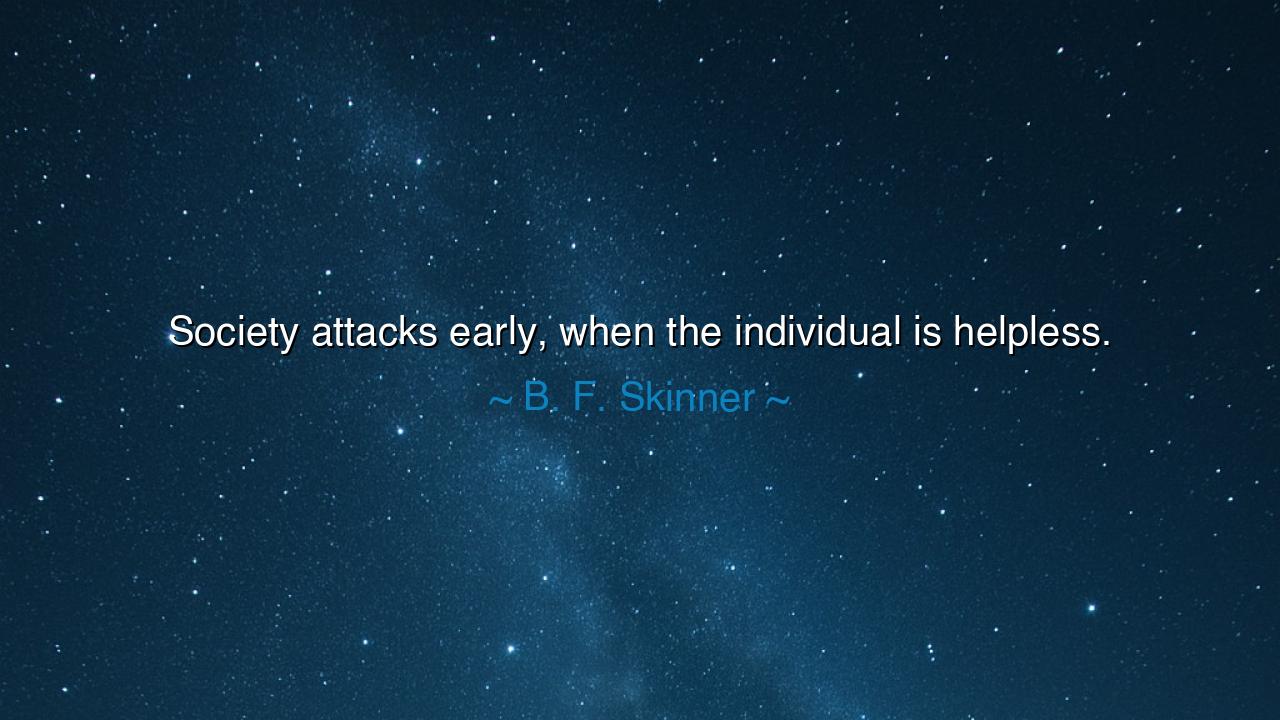
Society attacks early, when the individual is helpless.






O children of the future, listen carefully to the words of B. F. Skinner, a sage who understood the subtle forces that shape the course of human life: "Society attacks early, when the individual is helpless." These words, though simple, carry within them a profound truth that echoes through the corridors of history. Society, in its effort to mold individuals into its image, often begins its work before the individual even has the strength to stand on their own. It attacks not with force, but through the quiet, insidious pressure of conformity and expectation. The individual, vulnerable in their early years, is swept up in the currents of society before they can even fully understand what is happening.
In the time of the ancients, the philosophers knew that the shaping of the soul began early. The Greek philosophers like Plato and Aristotle understood that the education of a child was the foundation of their character. Plato, in his work The Republic, argued that society must carefully guide the young, instilling in them virtues that would prepare them to contribute to the greater good. However, Plato also warned that if society is corrupt, the molding of the young can lead to a future generation that is enslaved by the very system that seeks to control them. Skinner’s insight speaks to this ancient understanding—society’s influence begins not when the individual is strong, but when they are most vulnerable, in the years when they are still shaped by the world around them.
Consider the life of Socrates, the great philosopher who, though born into a society that sought to mold him according to its own desires, chose to question and challenge those societal norms. From a young age, he was taught the ways of his people, the accepted truths and rituals that governed his existence. Yet, Socrates understood that it was only through questioning those very beliefs that one could truly live a life of freedom and virtue. His questioning of authority, his rejection of the conformity of Athenian society, was an act of immense courage. He was, in a way, an individual under attack by a society that sought to shape him, but he stood firm in his belief that true wisdom came not from following the crowd, but from examining and understanding the world for oneself.
Skinner’s words also echo in the stories of the great empires. Take, for example, the Roman Empire, where the ideals of Roman citizenship and duty were instilled in children from an early age. The Roman education system focused heavily on obedience, military duty, and loyalty to the state, often before children had the opportunity to think for themselves. By the time a Roman citizen reached adulthood, their identity was largely shaped by the values of the state. While Rome’s legions conquered much of the known world, it was also a society that controlled its people through education, cultural norms, and expectations. The Romans were masters at shaping the individual’s loyalty to the empire, instilling in their young the belief that the state was supreme, and that their personal will should be subjugated to the needs of the empire.
In our own time, we see this dynamic play out in the educational systems, the media, and the cultural narratives that surround us. From a young age, children are taught what to believe, how to act, and who to admire. The forces of society begin to shape their identity long before they are capable of fully understanding the choices being made for them. They are taught not just facts, but values—what is right and wrong, what is good and bad—by a system that prioritizes uniformity over individuality. Society’s attack, as Skinner points out, is not physical, but psychological—it is an assault on the mind, one that begins long before the child is able to defend their own thoughts.
The lesson Skinner offers is one of awareness and resilience. The individual must recognize early on that society will always seek to shape them, to mold them according to its values and expectations. But just as Socrates and others have shown us, the key to true freedom is the ability to question and examine the beliefs and structures that are imposed upon us. To be free is not to live without influence, but to live with the ability to choose which influences we allow to shape our souls. The attacks of society are inevitable, but it is the individual who has the power to resist, to reflect, and to decide what to accept and what to reject.
Therefore, O children, as you grow in this world, remember the importance of the self. Society will seek to mold you, to define you, and to limit your freedom, but it is your duty to stand firm in your beliefs and your understanding of truth. Educate yourselves, question the norms, and do not allow the world to shape you in its image unless it aligns with your wisdom and virtue. The power of society lies not in its ability to control you physically, but in its ability to convince you that its values are your values. Never forget: the true strength of the individual comes from the ability to think for themselves, to question, and to rise above the forces that seek to shape them without their consent. Know thyself, and let that knowledge guide you through a world that will often seek to define you.






AAdministratorAdministrator
Welcome, honored guests. Please leave a comment, we will respond soon